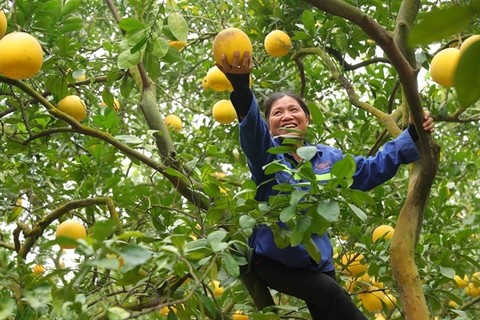
A grapefruit farm in Hà Nội. The issuance of planting area codes contributes to providing high-quality agricultural products, aiming to expand Hà Nội's agricultural export markets. — Photo courtesy of Hà Nội’s Department of Agriculture and Rural Development
Hà Nội has ramped up investments in recent years to establish planting area codes for key crops like longans, grapefruits and bananas, paving the way for official agricultural exports and delivering significant economic benefits to local farmers.
The issuance of planting area codes, which assigns specific identification numbers to production regions, serves as a 'passport' for Hà Nội's agricultural products, helping them compete domestically and enter international markets.
Trần Văn Bảy, a farmer in Hoài Đức District, said that before receiving a planting area code, his late-ripening longans were mostly exported informally to China. Despite meeting quality standards, access to markets like the US and Australia was blocked without the code. With support from Hà Nội's authorities, his longans are now exported to both countries.
Trương Văn Thường, Director of Thắng Lợi Safe Vegetable Production and Supply Cooperative in Thường Tín District, said since 2021, the cooperative has received a planting area code from the Hà Nội Sub-Department of Cultivation and Plant Protection, along with VietGAP certification for its exported bananas. This has streamlined sales and increased the value of local produce, with annual exports to China averaging 600 to 800 tonnes.
Nguyễn Thị Thu Hằng, Head of the Hà Nội Sub-Department of Quality, Processing and Market Development, said that Hà Nội has supported localities in managing planting area codes and packaging facilities, enhancing the competitiveness of agricultural exports.
Currently, 16 export planting area codes and 133 domestic codes have been issued. As a result, in the first half of 2024, Hà Nội’s agricultural, forestry and fishery exports exceeded US$1.2 billion, marking a 58.5 per cent increase, Hằng said.
Key exports include cinnamon, star anise, spices, green tea, vegetables, fruits, rice, shiitake mushrooms, black fungus, pepper and cassava starch.
The introduction of planting area codes has not only facilitated the domestic and international consumption of agricultural products, but also encouraged farmers to shift towards safe and sustainable farming practices, fostering a more professional and sustainable agricultural industry, she said.
Đào Thị Lương, Director of Tâm Anh Safe Vegetable, Fruit and Ecotourism Cooperative in Phú Xuyên District, said that the cooperative regularly educates its members on adhering to strict production processes and quality control measures required by partners.
This includes maintaining detailed farming records and ensuring the careful care, processing and storage of products. However, she also called for more support from relevant authorities in building value chains, branding, and participating in trade fairs, both within Hà Nội and beyond, to access modern distribution channels and export markets.
Phùng Thị Thu Hương, CEO of Green Path Vietnam, a leading fruit export company in Hà Nội, said that while different markets impose varied requirements for planting area codes, all certified areas must adhere to good agricultural practices and maintain comprehensive farming records to ensure traceability. She further noted that both farmers and businesses must take a proactive approach to pest control and strictly comply with pesticide residue regulations set by importing countries.
Alongside complying with VietGAP and GlobalGAP standards – two crucial certifications for ensuring safe and sustainable agricultural practices – major export markets have established even higher quality standards to minimise risks and guarantee traceability.
“Thus, obtaining a planting area code is crucial in affirming the safety and hygiene standards of agricultural products, building trust and reputation in the marketplace,” Hương said.
Nguyễn Đình Hoa, Deputy Director of Hà Nội’s Department of Agriculture and Rural Development, highlighted the city's strong potential for exporting fruits, flowers and ornamental plants. However, to access foreign markets, products from certified planting area code regions must meet quality standards, be free from harmful microorganisms, and comply with food safety regulations, along with proper packaging and labelling.
Hoa said that Hà Nội’s agricultural sector is collaborating with localities to provide technical training for farmers, businesses and officials on import regulations. The city is also intensifying inspections and tightening the management of planting area codes and packaging facilities to ensure compliance with phytosanitary and food safety standards.
Furthermore, efforts are underway to develop concentrated production areas with traceable, high-quality products, while encouraging businesses to invest in modern packaging facilities to meet international market demands, she said. — VNS